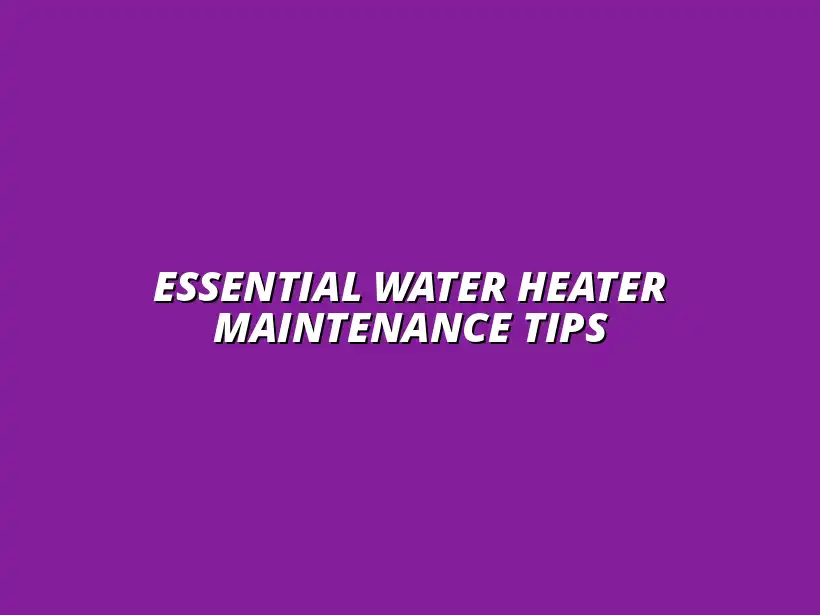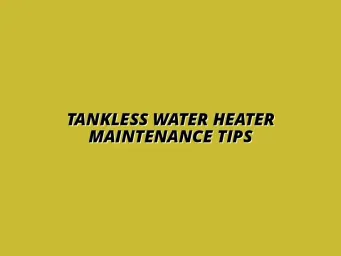
Essential Water Heater Maintenance Tips
Understanding the Importance of Water Heater Maintenance for Energy Efficiency
Maintaining your water heater is crucial for ensuring energy efficiency in your home. Water heaters account for a significant portion of household energy consumption, and understanding their role can help you manage energy costs effectively. By prioritizing maintenance, you not only keep your water heater running smoothly but also contribute to a more sustainable environment.
When your water heater functions efficiently, it can lead to lower energy bills and improved comfort levels in your home. Everyone appreciates the comfort of hot water, but it’s essential to recognize the financial implications that come with inefficient systems. Let’s dive deeper into how water heaters impact our energy usage and what we can do to optimize their performance. For example, regularly flushing your water heater can significantly improve its efficiency. Learn how to easily flush your water heater and keep those energy bills low.
The Role of Water Heaters in Household Energy Consumption
Water heaters play a key role in the energy consumption of a household. In fact, they can account for nearly 18% of the average home's energy use. This significant percentage highlights the need for homeowners to pay attention to their water heating systems and ensure they are operating efficiently.
Understanding the specifics of how water heaters consume energy can help you make informed decisions. Here are some critical points regarding their role in energy consumption:
- Water heaters heat water for various domestic tasks like bathing, cooking, and cleaning.
- Older or poorly maintained models tend to consume more energy due to inefficiencies.
- Choosing the right type of water heater can significantly impact your energy bills.
How Water Heaters Impact Monthly Energy Bills
Your monthly energy bill can rise dramatically if your water heater isn’t functioning optimally. An inefficient water heater can lead to excess energy consumption, which directly affects your wallet. It's important to regularly monitor your bills and be aware of any sudden increases. Regular maintenance is key to extending the lifespan of your water heater and avoiding costly repairs. Discover maintenance solutions to extend your water heater's lifespan.
Investing in regular maintenance can mitigate these unexpected costs. Here are ways your water heater can affect your monthly bills:
- Insulation quality can impact heat retention and energy use.
- Older units may require more energy to heat the same amount of water.
- Regular maintenance can prevent costly repairs and keep operational costs down.
The Connection Between Water Heater Efficiency and Home Comfort
Maintenance of your water heater not only affects energy bills but also influences your overall comfort at home. When your water heater operates efficiently, it provides a consistent supply of hot water, making daily activities smoother and more enjoyable. On the other hand, an inefficient water heater may lead to inconsistent water temperatures, which can be frustrating.
Here are some connections between efficiency and home comfort:
- Consistent hot water supply is essential for daily activities.
- Efficient water heating systems reduce the chances of breakdowns.
- Properly functioning heaters maintain optimal water temperatures more effectively.
What Constitutes Proper Water Heater Maintenance?
Proper maintenance of your water heater is essential for its longevity and efficiency. Regular care can significantly enhance performance and reduce energy consumption. It's important to be aware of the necessary maintenance tasks to keep your system in top shape. For example, an annual water heater inspection can help identify and address potential issues before they become major problems.
The following routine maintenance practices can help ensure your water heater operates efficiently:
- Inspecting the anode rod at least once a year.
- Flushing the tank to remove sediment buildup every six months.
- Checking for leaks and corrosion during routine inspections.
Routine Inspections and Their Benefits
Carrying out routine inspections of your water heater can help spot issues before they become significant problems. Regular checks can extend the life of your heater and improve its efficiency. Just like any other appliance, water heaters benefit from scheduled assessments. If you're experiencing issues with your water heater, addressing them quickly can prevent costly repairs down the road. Consider understanding water heater leak causes and fixes to take proactive steps.
Here are some benefits of routine inspections:
- Early detection of faults can save money on repairs.
- Maintains optimal energy efficiency over time.
- Helps ensure safety by identifying potential hazards.
Essential Maintenance Tasks for Longevity and Efficiency
To ensure your water heater lasts for many years, it’s essential to perform specific maintenance tasks regularly. These tasks are straightforward and can often be done by homeowners, leading to better efficiency and comfort. Let's look at some essential maintenance tasks. Protecting your water heater from freezing temperatures is also crucial, especially during winter months. Check out these tips to prevent your water heater from freezing this winter.
Here’s a list of tasks to incorporate into your maintenance routine:
- Test the pressure relief valve annually to ensure it’s functioning.
- Insulate the pipes around your water heater to reduce heat loss.
- Adjust the thermostat to 120°F for optimal energy savings.
Common Water Heater Issues and Their Energy Implications
Even with routine maintenance, water heaters can experience common issues that can lead to inefficiency. Being able to identify these problems is key to maintaining both energy efficiency and comfort in your home. Understanding these issues can save you time, money, and frustration.
Here are some common issues associated with water heaters:
- Fluctuating water temperatures due to thermostat or heating element faults.
- The presence of strange noises, indicating sediment buildup or other problems.
- Leaking tanks as a sign of aging or corrosion.
Identifying Signs of Inefficiency in Water Heaters
Recognizing the signs of inefficiency in your water heater is crucial for taking timely action. If you notice any irregularities in your system, it may be time to investigate further. Some signs to watch for include:
- Increased energy bills without a change in usage.
- Longer wait times for hot water.
- Unusual noises such as banging or popping sounds.
How Sediment Buildup Affects Energy Usage
Sediment buildup in your water heater can significantly impact its efficiency. Over time, minerals from hard water can collect at the bottom of the tank, creating a barrier between the water and the heating element. This buildup forces the heater to work harder, consuming more energy to achieve the desired temperatures.
To tackle sediment buildup effectively, consider these steps:
- Flush your water heater regularly to remove sediment.
- Use a water softener to reduce mineral deposits.
- Schedule professional maintenance to handle tough sediment issues.
Energy Savings Through Regular Maintenance Practices
Regular maintenance of your water heater not only helps avoid costly repairs, but it also leads to significant energy savings. By keeping your system in good working order, you can reduce your overall energy consumption. This is a win-win for both your finances and the environment! Regular checks are essential for maintaining optimal performance. Learn more about regular bathroom water heater checks for a comfortable and efficient home.
The energy savings can stack up over time, making maintenance a smart choice. Here are some ways to save energy through regular maintenance:
- Keep your water heater set to an optimal temperature.
- Insulate your water heater and its pipes.
- Regularly check and replace the anode rod.
The Financial Benefits of Maintaining Your Water Heater
Investing time and resources into maintaining your water heater can lead to substantial financial benefits. A well-maintained system operates more efficiently, which means lower energy bills. Over time, these savings can add up significantly!
Consider the following financial benefits:
- Reduced utility bills due to improved energy efficiency.
- Extended lifespan of the water heater, delaying replacement costs.
- Fewer emergency repairs, which can be expensive and inconvenient.
Energy-Saving Tips for Different Types of Water Heaters
It's important to note that different types of water heaters may require specific maintenance practices. Understanding these differences can help you maximize energy savings. Here are some handy tips tailored for various types of water heaters.
- For tankless water heaters, regularly clean filters to maintain water flow.
- For traditional tank heaters, flush the tank every six months.
- For solar water heaters, inspect panels and connections for optimal performance.
Frequently Asked Questions About Water Heater Maintenance
Water heater maintenance can be a confusing topic, which is why many homeowners have questions. Understanding the answers can help you make informed decisions about your water heating needs. Here are some common questions and their answers.
How Often Should I Service My Water Heater?
It's generally recommended that you service your water heater at least once a year. Regular maintenance helps catch any issues early and ensures optimal performance. If you notice any signs of inefficiency, such as higher energy bills or inconsistent water temperatures, you may want to schedule service sooner.
Can I Perform Maintenance on My Own?
Yes, many maintenance tasks can be performed by homeowners! Basic tasks like flushing the tank or checking the anode rod are relatively simple. However, for more complex issues or repairs, it's wise to consult a professional. For plumbing services in your area, consider checking out a professional like PlumbProCare.
Exploring Advanced Maintenance Techniques for Optimal Performance
In our quest for energy efficiency, understanding advanced maintenance techniques for water heaters is crucial. These techniques can significantly improve the performance of your system. With the right practices, we can save money and help the environment at the same time! Let’s dive deeper into how we can elevate our water heater maintenance.
Upgrading Your Water Heater for Improved Energy Efficiency
Knowing when to replace your water heater can make a big difference in energy consumption. If your water heater is over 10 years old, it might be time to consider a replacement. Newer models typically offer better energy efficiency, reducing both your carbon footprint and monthly bills.
When considering a new water heater, it's essential to look for features that enhance efficiency. Some factors to consider include:
- Energy Star Ratings: Look for models certified by Energy Star for maximum efficiency.
- Tankless Options: Tankless water heaters heat water on demand, which can save energy.
- Heat Pump Technology: This uses electricity to move heat rather than generate it, resulting in significant savings.
Upgrading not only leads to savings but also improves your home's comfort levels. By switching to a more efficient model, we can ensure hot water is always available when needed.
The Environmental Impact of Well-Maintained Water Heaters
Maintaining our water heaters properly can have a positive effect on the environment. Efficient water heating reduces energy usage, which means fewer resources are consumed. This, in turn, helps in reducing our carbon footprint.
Some benefits of efficient water heating include:
- Lower Greenhouse Gas Emissions: Less energy consumption translates to fewer emissions.
- Conservation of Water Resources: Efficient systems prevent wastage, contributing to water conservation.
- Improved Air Quality: Reducing energy waste helps decrease overall pollution.
By operating a well-maintained water heater, we contribute to sustainable living practices. Not only do we save energy, but we also protect our planet for future generations!
Professional vs. DIY Maintenance: What to Choose
Deciding between professional maintenance and doing it yourself can be tough. While professional services offer expertise, DIY maintenance can save money. Each option has its pros and cons, and understanding them is key to making the right choice.
Here are some benefits of hiring a professional:
- Expert Knowledge: They can spot issues that may not be obvious.
- Time-Saving: Professionals can complete tasks quickly and efficiently.
- Safety First: Trained technicians handle potentially dangerous repairs with care.
However, if you are looking to perform some basic maintenance yourself, here are a few tips:
- Check the Anode Rod: This prevents rust and corrosion.
- Flush the Tank: Remove sediment buildup to improve efficiency.
- Inspect the Pressure Relief Valve: Ensures safety and proper functioning.
Choosing between professional help and DIY greatly depends on your comfort level and the task at hand. Either way, keeping up with maintenance is vital!
Key Takeaways on Water Heater Maintenance and Energy Savings
To ensure energy efficiency with our water heaters, we must prioritize proper maintenance and upgrades. Some essential steps include:
- Conducting regular inspections to catch issues early.
- Considering upgrades to more efficient models.
- Choosing between DIY and professional maintenance based on needs.
In conclusion, maintaining our water heaters may seem like a small task, but it has significant implications for energy savings and environmental impact. I encourage everyone to make it a priority for long-term benefits!




